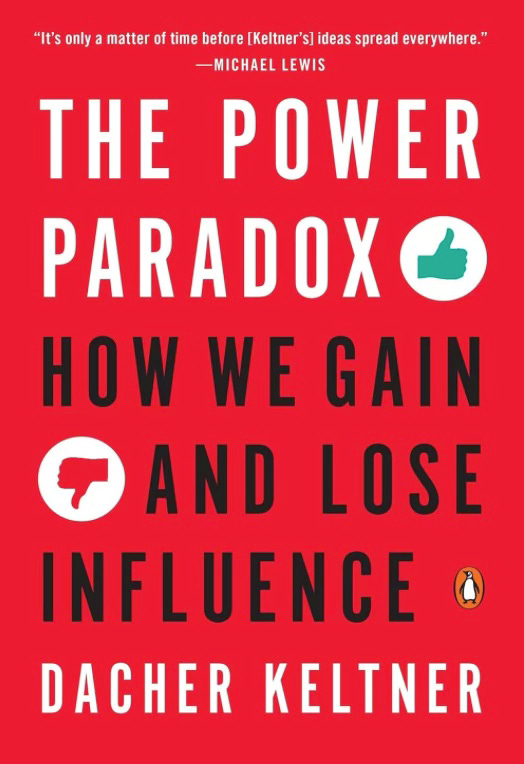Book Review: The Power Paradox - Dacher Keltner
Focus on Others Leads to Power. Power Leads to Focus on Yourself.
Title: The Power Paradox. How we gain and lose influence
Author: Dacher Keltner
Year: 2016
In short
The power paradox describes how practices that contribute to the greater good are what give us power, but these practices are ignored/dismissed once we have power which leads to a loss of power; power can lead us astray and to adopt the opposite of those practices that gave us power in the first place.
Enduring power comes from empathy, giving, expressing gratitude, and telling stories that unite.
Enduring power comes from being aware of feelings of power, understanding the power paradox, keeping up the practices that give you power in the first hand, and understanding the powerlessness around you (that you may also be caused by deviating from the enduring power practices).
Summary
"The power paradox is this: we rise in power and make a difference in the world due to what is best about human nature, but we fall from power due to what is worst. We gain the capacity to make a difference in the world by enhancing the lives of others, but the very experience of having power and privilege leads us to behave, in our worst moments, like impulsive, out-of-control sociopaths." (1-2)
Power is not just a capacity to act and make a difference in the world, influencing others. It is also an inner state of mind.
You gain & maintain power by balancing your own needs with those of others - with a focus more on others. You lose power by self-gratification.
Power is all around you
Defining power as force or coercion blinds us to the ubiquitous role of power in our everyday lives. If defined more broadly, power is about making a difference in the world, and we do that by influencing the lives of other people:
Principle 1: Power is about altering the states of others.
Principle 2: Power is part of every relationship and interaction.
Principle 3: Power is found in everyday actions.
Principle 4: Power comes from empowering others in networks.
"If our power is found in our social networks, then it follows that it is based on how well we empower others. And we empower others through daily acts of influence: by acknowledging another's good work,by offering an encouraging phrase or making appreciative eye contact, or by giving other responsibilities, resources, and opportunities." (38)
Making a difference in the world, and influencing others, feels good in a particular way: it's exciting, it inspires (rather than calming down and soothing). It gives rise to feelings associated with dopamine.
Power is given, not taken
Principle 5: Groups give power to those who advance the greater good.
Principle 6: Groups construct reputations that determine the capacity to influence.
Principle 7: Groups reward those who advance the greater good with status and esteem.
Principle 8: Groups punish those who undermine the greater good with gossip.
Studies show a correlation between the influence people have and their display of the Big Five social tendencies: enthusiasm, kindness, focus, calmness, openness.
Gossip is a social mechanism to take away power. Although it may be directed unfairly and amount to bullying, in most cases it is directed at those who do harm to the greater good.
Enduring Power Comes from a Focus on Others
Principle 9: Enduring power comes from empathy.
Principle 10: Enduring power comes from giving.
Principle 11: Enduring power comes from expressing gratitude.
Principle 12: Enduring power comes from telling stories that unite.
"We gain and maintain power through empathy, but in our experience of power, we lose our focus on others. We gain and maintain power through giving, but when we are feeling powerful, we act in self-gratifying and often greedy ways. Dignifying others with expressions of gratitude is essential to achieving enduring power, but once we feel powerful, we become rude and offensive. We build enduring power by telling stories that unite, but once we feel powerful, we tell stories that divide and demean."(100)
Power Corrupts You
Principle 13: Power leads to empathy deficits and diminished moral sentiments.
Principle 14: Power leads to self-serving impulsivity.
Principle 15: Power leads to incivility and disrespect.
Principle 16: Power leads to narratives of exceptionalism.
💡 Focus on others leads to power. Power leads to focus on yourself.
When powerful, you are inspired more by your own experiences than by the experiences of others.
"Simply thinking we are above others triggers more unethical behavior." (126)
There are warning signs for the power paradox, i.e. abuses of power unfolding: if people around us start feeling powerless, which often expresses in stress, anxiety, and shame.
Understanding and being aware of powerlessness can help us avoid the power paradox.
Powerlessness affects the health of individuals and communities.
The Price of Powerlessness
Principle 17: Powerlessness involves facing environments of continual threat.
Principle 18: Stress defines the experience of powerlessness.
Principle 19: Powerlessness undermines the individual's ability to contribute to society.
Principle 20: Powerlessness causes poor health.
Powerlessness triggers cortisol, the stress hormone. Chronically high levels of cortisol increase myelin (the layer on the nerve's axons that insulates them while increasing the strength of electrical signals) in the hippocampus and amygdala, adding to heightened threat sensitivity which leads to more stress.
5 Ways to Enduring Power
Be aware of your feelings of power: when are you feeling it? what is it pointing you towards?
Practice humility: power is a gift by those around you; stay critical of your own power, be open-minded toward the opinions/criticisms of others.
Stay focused on others and give: most importantly, empower others.
Practice respect.
Change the psychological context of powerlessness: work to avoid the costs of powerlessness through social or political change.
Learn More About Power
Related Articles
Further Resources
Dr. Dacher Keltner, UC Berkeley psychology professor & expert on emotions
Dr. Jeffrey Pfeffer, Stanford professor of organizational behavior





